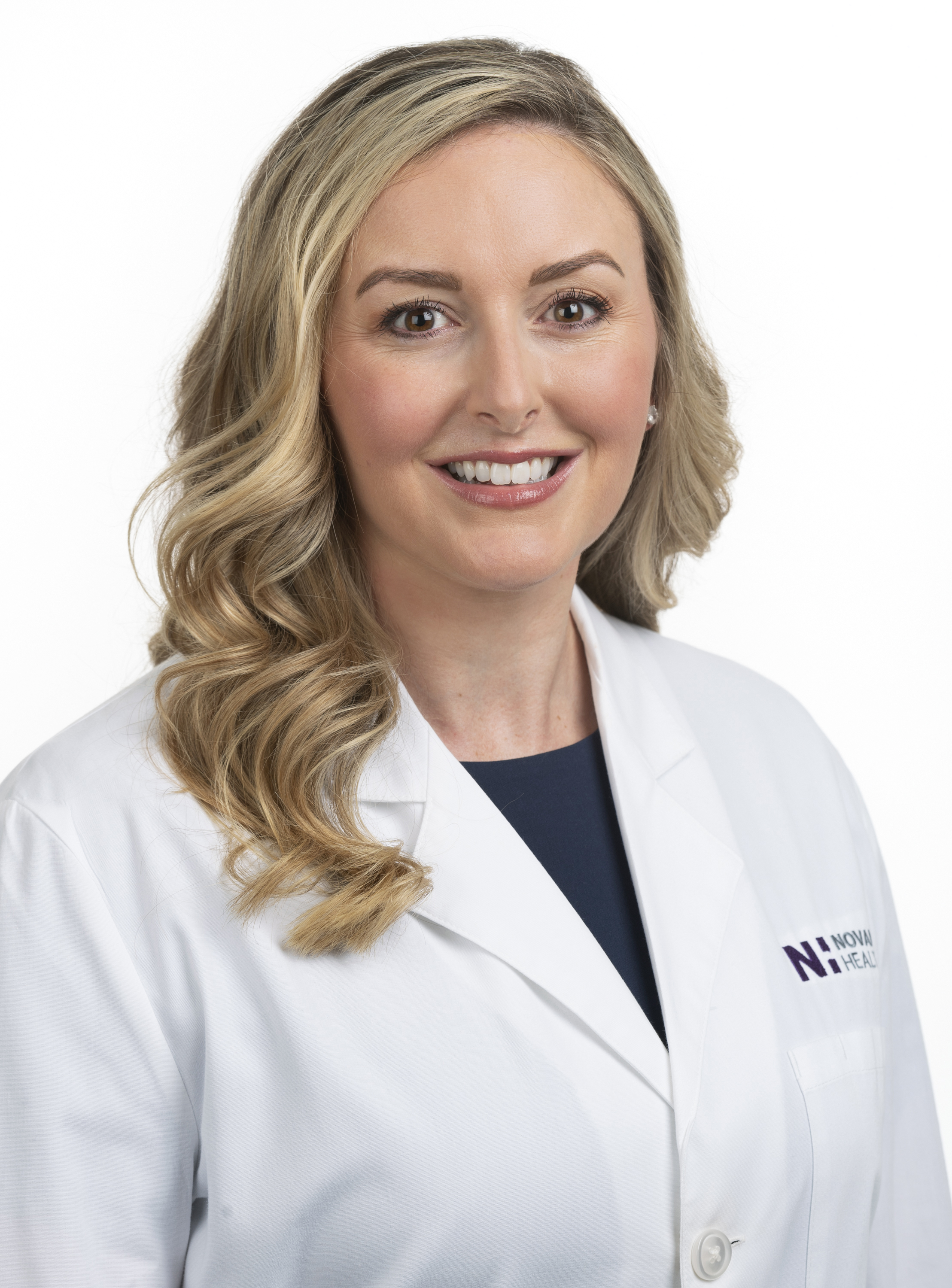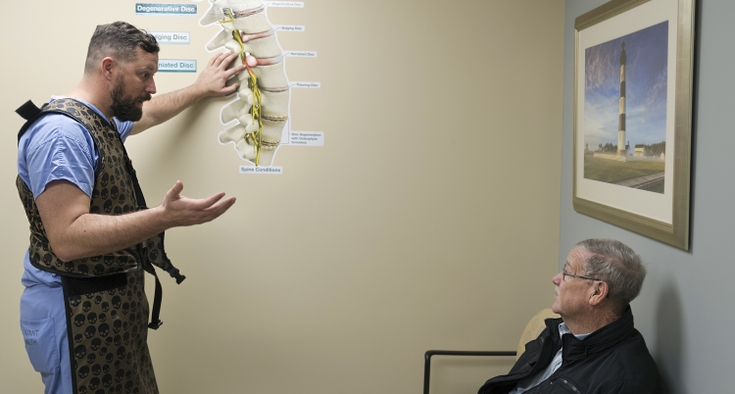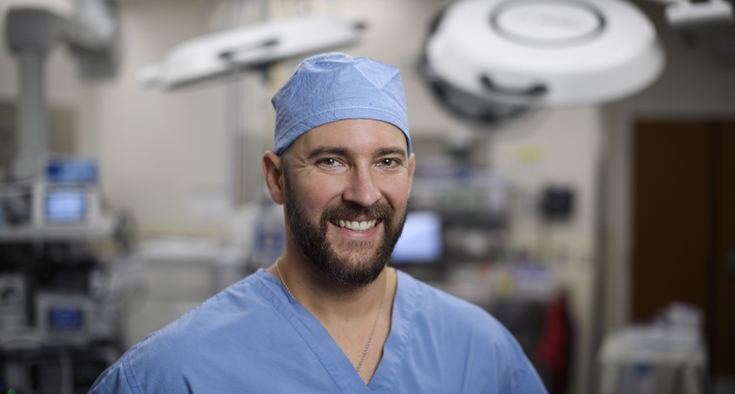Effective medical care for back, neck, and spine pain often demands a personalized, conservative approach. Novant Health's integrative spine care management model prioritizes nonsurgical solutions through seamless collaboration among spine surgeons, physiatrists, neurologists, therapists and advanced practice providers (APPs). This multidisciplinary strategy focuses on improving function, minimizing medication dependence, and enhancing patients' quality of life — delaying or avoiding surgery whenever possible.

In the back and spine field, new and advancing therapies are coming out every year to help patients with new nonsurgical and minimally invasive therapies," says Kyle Sebastian, MD, an interventional spine specialist with Novant Health. "We develop plans catering to each patient's goals and needs."

Novant Health's unique collaborative care model relies on its coordination network. Interventionalists, APPs and spine surgeons work together to determine which patients really do need surgery or could possibly benefit from surgery.
"Our team-based approach means we see patients in conjunction with our outstanding APPs, and APPs also see patients independently. This allows our team to help more patients, and to sort patients based on their progression within their spine care workup and treatment course," said Kelly Wackerle, MD, a neurosurgeon with Novant Health Spine Specialists in Charlotte.
"When APPs have independent clinics, we discuss any challenging cases and review imaging so recommendations are often a shared plan that includes the input of a surgeon. The APPs with our spine group are incredibly experienced and have excellent clinical judgement."
Evidence-based pain management
Any key comorbidities are also addressed early, in coordination with medical specialists to provide comprehensive care solutions. Unified teams frequently co-manage cases and streamline referrals — often within a day — to ensure timely, complete care. By emphasizing efficiency through focused histories and physical exams, individualized treatment plans come together quickly. Novant Health empowers patients with education and options by fostering open communication and offering flexible care pathways.
"Spine problems can occur simultaneously with other joint conditions, or can be difficult to distinguish from issues in the shoulder, hip or knee — neurosurgeons and orthopedic surgeons rely on extensive diagnostic tools and physician exam maneuvers to tell them apart," Wackerle said. "If you think a medical issue might be coming from spine, we can always help — even if we end up sending the patient to our favorite hip surgeon!"
Nonoperative management of chronic pain is grounded in an evidence-based, multidisciplinary approach.
"We typically begin with conservative measures and escalate care only as needed, ensuring patients receive the most appropriate and effective interventions at every stage," Sebastian said.
First-line treatments include physical and occupational therapy to improve mobility, strength and function. Medications such as anti-inflammatories, muscle relaxants, and nerve medications like gabapentin are used to address pain. At the same time, adjunct therapies involving neuromodulators and antidepressants may be employed for complex pain syndromes.
Lifestyle modifications play a pivotal role. Patients are guided through weight management, nutritional counseling, smoking cessation and activity modification.
"Referring physicians should remember that motion is good for the spine in 95% of cases," Wackerle said. "If a patient does not have a fracture, encourage patients to keep moving. A good physical therapist can change the trajectory of a patient's life from possibly needing surgery to living a long life without any surgery — or at least delaying the onset of the first surgery."
Additional modalities such as chiropractic care, acupuncture, massage therapy and biofeedback support a holistic and personalized pain prevention program designed to enhance long-term outcomes.
For patients who do not respond adequately to these less invasive care options, Novant Health offers interventional options that are both diagnostic and therapeutic. Nerve blocks are commonly utilized to localize and mitigate pain, ranging from short-acting diagnostic blocks to longer-lasting therapeutic injections involving corticosteroids or anesthetics. These procedures are typically image-guided and performed on an outpatient basis, which can offer short to long-term relief for conditions like lumbar radiculopathy, arthritis-related pain and peripheral nerve entrapments.
When needed, more advanced minimally invasive options are available.
In the care continuum, it may be necessary to discuss surgery right from the start, or more often, after all the above options have been considered or trialed. Our board-certified neurosurgeons specializing in spine have trained with the best in the country and are ready to transition a patient to surgical discussions when appropriate. As a team, the Novant Health Spine Specialists are dedicated to the provision of leading-edge treatments with proven excellent clinical results.
Treatment availability varies by location - now offered at: locations:
Triad Region
Novant Health Brain and Spine Specialists 336-660-5480 Greensboro, NC
Novant Health Brain and Spine Specialists 336-481-8670 High Point, NC
Novant Health Brain and Spine Surgery 336-277-0220 Mount Airy, NC
Novant Health Brain and Spine Surgery 336-893-3190 Bermuda Run, NC
Novant Health Brain and Spine Surgery 336-277-2225 Winston-Salem, NC
Novant Health Brain and Spine Surgery 336-660-5470 Greensboro, NC
Novant Health Brain and Spine Surgery 336-515-7336 Kernersville, NC
Novant Health Brain and Spine Surgery 336-481-8670 High Point, NC
Charlotte Region
Novant Health Spine Specialists 704-367-4800 Charlotte, NC
Novant Health Spine Specialists 704-895-9838 Huntersville, NC







